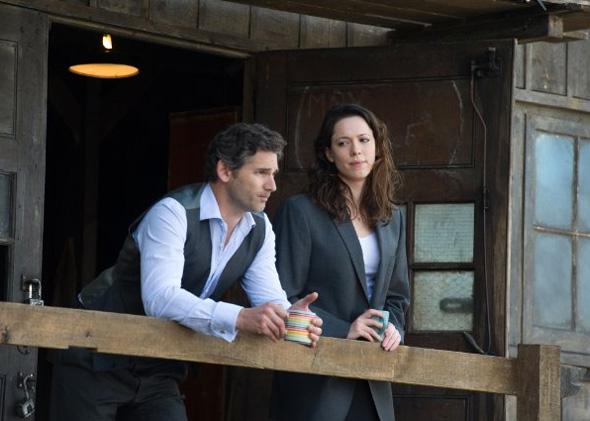There are two things you can usually count on from any half-decent political thriller: A passel of government officials who seek to keep their nefarious plans hidden from the public and heroes who will be subjected to almost constant surveillance. These elements are present in everything from The Parallax View (1974) to Eagle Eye (2008), reflecting our real-life anxieties about the uneasy tradeoffs we make between security and privacy.* Closed Circuit, the new political thriller set in dreary contemporary London, is content to play by these well-established rules. But there are enough genuine moments of surprise to make this genre exercise an invigorating one.
The stakes are high from the film’s very first moments. As surveillance cameras look on from every conceivable angle, a white van explodes in the middle of a bustling London marketplace. Not long after, a suspected international terrorist is apprehended and jailed, his case quickly dubbed “the trial of the century.” But not your standard trial of the century. The government announces that the trial will include a closed session for the presentation of classified evidence, the details of which will be kept secret from both the defendant, one Farroukh Erdogan (Denis Moschitto), and his lawyer.
Luckily for Erdogan, such closed sessions call for the appointment of a Special Advocate, a barrister who represents the interests of the defendant during the secret proceedings; Claudia Simmons-Howe (Rebecca Hall) takes on that role for Erdogan. The script pulls off an admirably swift explanation of the SA’s role for those of us unfamiliar with the British legal system: The SA has access to both the nonclassified material as well as the closed material. But once she has seen the latter, she is prohibited from speaking directly with the defendant or the defendant’s lawyer—all communication must go through the Special Advocate Support Office, to prevent disclosure of classified information. In addition to attending the closed sessions, Claudia is to be present for all of the open sessions to examine how the defendant’s lawyers are presenting the case.
As if the SA’s job weren’t complicated enough already, Claudia’s got history with Erdogan’s lawyer, Martin Rose (Eric Bana), who takes over after Erdogan’s first lawyer suddenly turns up dead. Martin and Claudia share a fraught romantic past, and plenty of pent up tension, but Martin convinces her not to disclose their previous relationship so they can both undertake the career-defining assignment at hand.
Unsurprisingly, they are unable to adhere to the strict rules of their jobs for very long, as the film briskly follows the two as they close in on the nature of Erdogan’s involvement with the attack. Martin’s efforts are closely monitored by the never-named attorney general (played sinisterly by Jim Broadbent), who tosses around thinly veiled threats whenever Martin hovers too closely to the truth. Meanwhile, Claudia must contend with an omnipresent MI5 agent (Riz Ahmed), who introduces himself as an aide but ultimately proves more of a hindrance.
Director John Crowley and screenwriter Steve Knight successfully conjure a post-9/11 and 7/7 society under surveillance, with security cameras frequently serving as the viewer’s lens. And they do a good job of steadily ratcheting up the suspense as well. As Martin and Claudia’s investigations begin to converge, Closed Circuit continues to raise the stakes and put the ex-lovers in increasing danger. At the outset, the seasoned lawyers exhibit some of the jadedness that characterized the public response to the leaked details of the NSA’s surveillance program earlier this year. But the more they learn about the government’s dirty tactics, the more they take on a very real paranoia. The film’s message is alarmist, but in this summer of Snowden, perhaps not so fantastical: So long as Claudia and Martin do as the government insists, they’ll be fine. When they don’t, the consequences are swift and harsh.
It all makes for solid entertainment, though the film does suffer from an undercooked finale. After months of overlong blockbusters, Closed Circuit offers a good, swift pace (it clocks in at just around 90 minutes), but the last few moments take that brevity to an extreme, explaining away the outcome of the trial via brief dialogue laid over an aerial shot of London. The ending is abrupt, and the film as a whole won’t linger in your mind long afterward in the way that superior surveillance-themed films like The Conversation do—but for now, at least, there’s enough real-world government intrigue afoot to give Closed Circuit a scarily resonant kick.
Correction, Aug. 30, 2013: This review originially misstated the date that Parallax Review was released. It was released in 1974, not 1962. (Return to the corrected sentence.)
